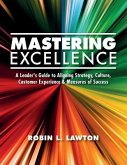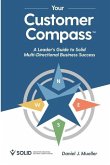Rosalind Bergemann
An Asperger Leader's Guide to Living and Leading Change
Rosalind Bergemann
An Asperger Leader's Guide to Living and Leading Change
- Broschiertes Buch
- Merkliste
- Auf die Merkliste
- Bewerten Bewerten
- Teilen
- Produkt teilen
- Produkterinnerung
- Produkterinnerung
People with Asperger Syndrome (AS) often struggle with change and this is magnified when it is part of their professional role to manage and lead change. Written by a business leader with Asperger Syndrome, this practical guide provides advice and strategies on coping with and implementing change in the workplace.
Andere Kunden interessierten sich auch für
![The Christian Leader's Worldview: A Framework for Successful Leadership and Living The Christian Leader's Worldview: A Framework for Successful Leadership and Living]() Michael J. LapierreThe Christian Leader's Worldview: A Framework for Successful Leadership and Living19,99 €
Michael J. LapierreThe Christian Leader's Worldview: A Framework for Successful Leadership and Living19,99 €![The Leader's Guide to Coaching: Discover & Develop the Strengths of Your People The Leader's Guide to Coaching: Discover & Develop the Strengths of Your People]() Mark KellyThe Leader's Guide to Coaching: Discover & Develop the Strengths of Your People13,99 €
Mark KellyThe Leader's Guide to Coaching: Discover & Develop the Strengths of Your People13,99 €![Mastering Excellence: A Leader's Guide to Aligning Strategy, Culture, Customer Experience & Measures of Success Mastering Excellence: A Leader's Guide to Aligning Strategy, Culture, Customer Experience & Measures of Success]() Robin L. LawtonMastering Excellence: A Leader's Guide to Aligning Strategy, Culture, Customer Experience & Measures of Success29,99 €
Robin L. LawtonMastering Excellence: A Leader's Guide to Aligning Strategy, Culture, Customer Experience & Measures of Success29,99 €![Your Customer Compass: A Leader's Guide to Solid Multi-Directional Business Success Your Customer Compass: A Leader's Guide to Solid Multi-Directional Business Success]() Daniel J. MuellerYour Customer Compass: A Leader's Guide to Solid Multi-Directional Business Success17,99 €
Daniel J. MuellerYour Customer Compass: A Leader's Guide to Solid Multi-Directional Business Success17,99 €![Developing the Leader's Heart: How Jesus Shaped 12 Men in 3 Years to Change the World Developing the Leader's Heart: How Jesus Shaped 12 Men in 3 Years to Change the World]() Bill LawrenceDeveloping the Leader's Heart: How Jesus Shaped 12 Men in 3 Years to Change the World13,99 €
Bill LawrenceDeveloping the Leader's Heart: How Jesus Shaped 12 Men in 3 Years to Change the World13,99 €![Be The Best Boss: A New Leader's Guide To Success Be The Best Boss: A New Leader's Guide To Success]() Mary WalterBe The Best Boss: A New Leader's Guide To Success13,99 €
Mary WalterBe The Best Boss: A New Leader's Guide To Success13,99 €![Five Steps to Five Stars: A Leader's Guide to Improving Customer Service Five Steps to Five Stars: A Leader's Guide to Improving Customer Service]() Alvin L. BlakeFive Steps to Five Stars: A Leader's Guide to Improving Customer Service14,99 €
Alvin L. BlakeFive Steps to Five Stars: A Leader's Guide to Improving Customer Service14,99 €-
-
-
People with Asperger Syndrome (AS) often struggle with change and this is magnified when it is part of their professional role to manage and lead change. Written by a business leader with Asperger Syndrome, this practical guide provides advice and strategies on coping with and implementing change in the workplace.
Hinweis: Dieser Artikel kann nur an eine deutsche Lieferadresse ausgeliefert werden.
Hinweis: Dieser Artikel kann nur an eine deutsche Lieferadresse ausgeliefert werden.
Produktdetails
- Produktdetails
- Verlag: Jessica Kingsley Publishers
- Seitenzahl: 264
- Erscheinungstermin: 21. November 2013
- Englisch
- Abmessung: 245mm x 174mm x 14mm
- Gewicht: 472g
- ISBN-13: 9781849054713
- ISBN-10: 1849054711
- Artikelnr.: 39075528
- Herstellerkennzeichnung
- Produktsicherheitsverantwortliche/r
- Europaallee 1
- 36244 Bad Hersfeld
- gpsr@libri.de
- Verlag: Jessica Kingsley Publishers
- Seitenzahl: 264
- Erscheinungstermin: 21. November 2013
- Englisch
- Abmessung: 245mm x 174mm x 14mm
- Gewicht: 472g
- ISBN-13: 9781849054713
- ISBN-10: 1849054711
- Artikelnr.: 39075528
- Herstellerkennzeichnung
- Produktsicherheitsverantwortliche/r
- Europaallee 1
- 36244 Bad Hersfeld
- gpsr@libri.de
Dr. Rosalind A. Bergemann has worked as a business leader for over 20 years, having held positions in global business strategy, finance and international human resources. She is Chairperson of Asperger Leaders, an organisation supporting people with Asperger Syndrome holding senior positions in business, Non-Executive Director of Brain in Hand, a company providing a phone app and telephonic support system to people with autism in the workplace, and Chief Executive Officer of a global change management consultancy. She is educated to doctorate level in the fields of international business and organisational psychology, as well as leadership studies through Harvard Business School. Dr. Bergemann was named Consultant of the Year at the National Management and Leadership Awards 2013 by the UK Chartered Management Institute. She is based in London, UK.
Foreword by Will Napier. Introduction. Part 1: The Change Life Cycle and
How that Affects Us as Leaders with Asperger Syndrome. 1. Defining the
Asperger Leadership Challenge. 2. Examining the Psychological Contract. 3.
Understanding the Transitional Stages and the Psychological Change Cycle.
4. Understanding How Change Affects You. 5. Understanding How Change
Affects Them. 6. Understanding How Change Affects the Organisation. Part 2:
Some Defining Characteristics of Asperger Leaders and their Relevance for
the Change Process. 7. Characteristic 1: The Centre of Knowledge. 8.
Characteristic 2: Above Average Intellectual Skills. 9. Characteristic 3:
Social Dichotomy - Social when Necessary, Loner when Able. 10.
Characteristic 4: Need for Personal Space. 11. Characteristic 5: Delegation
Challenges. 12. Characteristic 6: The Natural Leader in Times of Crisis.
Part 3: Key Skills for Successfully Living and Leading Change. 13. Key
Skill 1: Understanding Yourself and Your Reaction to Change. 14. Key Skill
2: Making Communication a Focus. 15. Key Skill 3: Preparing Them for
Change. 16. Key Skill 4: Programme Management and Its Application. 17. Key
Skill 5: Establishing the Rules for Change. 18. Key Skill 6: Motivating the
Team - Challenges, Opportunities and Rewards. 19. Key Skill 7: Dealing with
the Undercurrents. 20. Key Skill 8: Acknowledging Individuals Facing
Challenges. 21. Key Skill 9: Developing Internal Change Agents. 22. Key
Skill 10: Working with External Consultants. 23. Key Skill 11: Establishing
a New Culture. 24. Key Skill 12: Applying the 5th Stage of the Transitional
Change Cycle. 25. Summary and Application. Part 4: Practical Tools for
Asperger Leaders Leading Change.
How that Affects Us as Leaders with Asperger Syndrome. 1. Defining the
Asperger Leadership Challenge. 2. Examining the Psychological Contract. 3.
Understanding the Transitional Stages and the Psychological Change Cycle.
4. Understanding How Change Affects You. 5. Understanding How Change
Affects Them. 6. Understanding How Change Affects the Organisation. Part 2:
Some Defining Characteristics of Asperger Leaders and their Relevance for
the Change Process. 7. Characteristic 1: The Centre of Knowledge. 8.
Characteristic 2: Above Average Intellectual Skills. 9. Characteristic 3:
Social Dichotomy - Social when Necessary, Loner when Able. 10.
Characteristic 4: Need for Personal Space. 11. Characteristic 5: Delegation
Challenges. 12. Characteristic 6: The Natural Leader in Times of Crisis.
Part 3: Key Skills for Successfully Living and Leading Change. 13. Key
Skill 1: Understanding Yourself and Your Reaction to Change. 14. Key Skill
2: Making Communication a Focus. 15. Key Skill 3: Preparing Them for
Change. 16. Key Skill 4: Programme Management and Its Application. 17. Key
Skill 5: Establishing the Rules for Change. 18. Key Skill 6: Motivating the
Team - Challenges, Opportunities and Rewards. 19. Key Skill 7: Dealing with
the Undercurrents. 20. Key Skill 8: Acknowledging Individuals Facing
Challenges. 21. Key Skill 9: Developing Internal Change Agents. 22. Key
Skill 10: Working with External Consultants. 23. Key Skill 11: Establishing
a New Culture. 24. Key Skill 12: Applying the 5th Stage of the Transitional
Change Cycle. 25. Summary and Application. Part 4: Practical Tools for
Asperger Leaders Leading Change.
Foreword by Will Napier. Introduction. Part 1: The Change Life Cycle and
How that Affects Us as Leaders with Asperger Syndrome. 1. Defining the
Asperger Leadership Challenge. 2. Examining the Psychological Contract. 3.
Understanding the Transitional Stages and the Psychological Change Cycle.
4. Understanding How Change Affects You. 5. Understanding How Change
Affects Them. 6. Understanding How Change Affects the Organisation. Part 2:
Some Defining Characteristics of Asperger Leaders and their Relevance for
the Change Process. 7. Characteristic 1: The Centre of Knowledge. 8.
Characteristic 2: Above Average Intellectual Skills. 9. Characteristic 3:
Social Dichotomy - Social when Necessary, Loner when Able. 10.
Characteristic 4: Need for Personal Space. 11. Characteristic 5: Delegation
Challenges. 12. Characteristic 6: The Natural Leader in Times of Crisis.
Part 3: Key Skills for Successfully Living and Leading Change. 13. Key
Skill 1: Understanding Yourself and Your Reaction to Change. 14. Key Skill
2: Making Communication a Focus. 15. Key Skill 3: Preparing Them for
Change. 16. Key Skill 4: Programme Management and Its Application. 17. Key
Skill 5: Establishing the Rules for Change. 18. Key Skill 6: Motivating the
Team - Challenges, Opportunities and Rewards. 19. Key Skill 7: Dealing with
the Undercurrents. 20. Key Skill 8: Acknowledging Individuals Facing
Challenges. 21. Key Skill 9: Developing Internal Change Agents. 22. Key
Skill 10: Working with External Consultants. 23. Key Skill 11: Establishing
a New Culture. 24. Key Skill 12: Applying the 5th Stage of the Transitional
Change Cycle. 25. Summary and Application. Part 4: Practical Tools for
Asperger Leaders Leading Change.
How that Affects Us as Leaders with Asperger Syndrome. 1. Defining the
Asperger Leadership Challenge. 2. Examining the Psychological Contract. 3.
Understanding the Transitional Stages and the Psychological Change Cycle.
4. Understanding How Change Affects You. 5. Understanding How Change
Affects Them. 6. Understanding How Change Affects the Organisation. Part 2:
Some Defining Characteristics of Asperger Leaders and their Relevance for
the Change Process. 7. Characteristic 1: The Centre of Knowledge. 8.
Characteristic 2: Above Average Intellectual Skills. 9. Characteristic 3:
Social Dichotomy - Social when Necessary, Loner when Able. 10.
Characteristic 4: Need for Personal Space. 11. Characteristic 5: Delegation
Challenges. 12. Characteristic 6: The Natural Leader in Times of Crisis.
Part 3: Key Skills for Successfully Living and Leading Change. 13. Key
Skill 1: Understanding Yourself and Your Reaction to Change. 14. Key Skill
2: Making Communication a Focus. 15. Key Skill 3: Preparing Them for
Change. 16. Key Skill 4: Programme Management and Its Application. 17. Key
Skill 5: Establishing the Rules for Change. 18. Key Skill 6: Motivating the
Team - Challenges, Opportunities and Rewards. 19. Key Skill 7: Dealing with
the Undercurrents. 20. Key Skill 8: Acknowledging Individuals Facing
Challenges. 21. Key Skill 9: Developing Internal Change Agents. 22. Key
Skill 10: Working with External Consultants. 23. Key Skill 11: Establishing
a New Culture. 24. Key Skill 12: Applying the 5th Stage of the Transitional
Change Cycle. 25. Summary and Application. Part 4: Practical Tools for
Asperger Leaders Leading Change.








